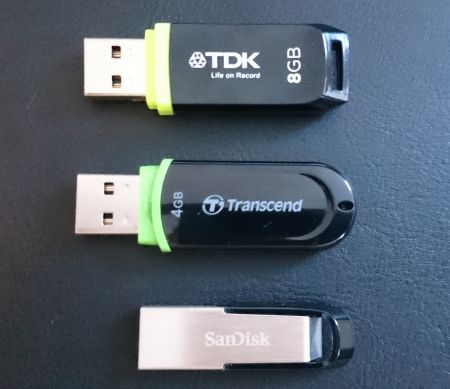More or less two weeks ago, I tweeted about my NAS (Debian Jessie running on a HP Proliant N40L micro server) is dead because the USB Flash Drive (on which the OS was installed) died.
I removed the supposedly dead USB drive, inserted a new one and installed a fresh Debian (Stretch this time) on it. Took quite some time, given the USB flash drive was very slow to write on to, but eventually my NAS was up again.
The slow write speed led me to buy a new USB flash drive which was supposed to be much faster. Really? How does one compare actual write and read speed of USB flash drives? There's an app tool for it! It's called F3 and its main purpose is to find bad USB flash drives which claim to have a certain capacity but are in fact offering much less than what's written on the drive. This tool writes multiple files onto the flash drive until all space is used and then reads these files again. The comparison from written sectors vs. read sectors would show if a flash drive was advertising a wrong capacity. F3 also shows the actual write and read speeds and shows an average at the end of both steps. That can be used to compare speeds of USB flash drives!
I compared three USB flash/pen drives:

All drives were inserted into the same USB 2.0 port so they can operate with the same bus speed (the Sandisk Ultra supports USB 3.0 but this wouldn't be a fair comparison to the older pen drives).
First I installed f3:
# apt-get install f3
A typical test run starts with the f3write command on the filesystem mounted from the pen drive:
# f3write /mnt/Test/
Free space: 2.35 GB
Creating file 1.h2w ... OK!
Creating file 2.h2w ... OK!
Creating file 3.h2w ... OK!
Free space: 16.00 MB
Average writing speed: 1.74 MB/s
Followed by the read operation of these created files:
# f3read /mnt/Test/
SECTORS ok/corrupted/changed/overwritten
Validating file 1.h2w ... 2097152/ 0/ 0/ 0
Validating file 2.h2w ... 2097152/ 0/ 0/ 0
Validating file 3.h2w ... 710064/ 0/ 0/ 0
Data OK: 2.34 GB (4904368 sectors)
Data LOST: 0.00 Byte (0 sectors)
Corrupted: 0.00 Byte (0 sectors)
Slightly changed: 0.00 Byte (0 sectors)
Overwritten: 0.00 Byte (0 sectors)
Average reading speed: 16.48 MB/s
Here are the results for the speed comparison:
| USB Flash Drive |
Average Write Speed |
Average Read Speed |
| TDK TF10 8GB (0718:070a) |
1.74 MB/s | 16.48 MB/s |
| Transcend JetFlash 4GB (8564:1000) |
1.89 MB/s | 14.66 MB/s |
| Sandisk Ultra Flair 32GB (0781:5591) |
13.14 MB/s | 34.02 MB/s |
| Sandisk Ultra 32GB (0781:5581) |
13.01 MB/s |
33.67 MB/s |
| Generic USB stick 2GB (090c:1000) |
5.86 MB/s |
19.30 MB/s |
Clearly the Sandisk pen drive is much faster on write speed but only twice as fast on read speed. Anyway, thanks to this benchmark test the Sandisk drive will become the new USB flash drive for the NAS server.
Updated November 29th 2019: Added Sandisk Ultra 32GB (USB ID 0781:5581)
Updated December 1st 2019: Added Generic USB stick 2GB (090c:1000)
No comments yet.

AWS Android Ansible Apache Apple Atlassian BSD Backup Bash Bluecoat CMS Chef Cloud Coding Consul Containers CouchDB DB DNS Databases Docker ELK Elasticsearch Filebeat FreeBSD Galera Git GlusterFS Grafana Graphics HAProxy HTML Hacks Hardware Icinga Influx Internet Java KVM Kibana Kodi Kubernetes LVM LXC Linux Logstash Mac Macintosh Mail MariaDB Minio MongoDB Monitoring Multimedia MySQL NFS Nagios Network Nginx OSSEC OTRS Observability Office OpenSearch PHP Perl Personal PostgreSQL PowerDNS Proxmox Proxy Python Rancher Rant Redis Roundcube SSL Samba Seafile Security Shell SmartOS Solaris Surveillance Systemd TLS Tomcat Ubuntu Unix VMware Varnish Virtualization Windows Wireless Wordpress Wyse ZFS Zoneminder